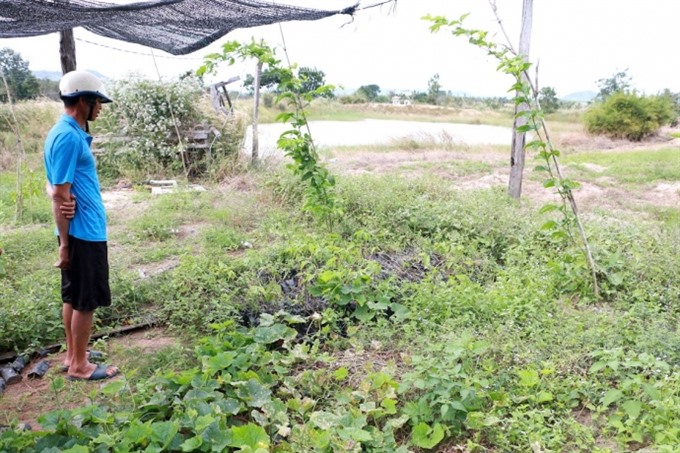 Society
Society

" />Farmers in Chư A Thai Commune in the Central Highland province of Gia Lai are incurring losses after shifting to growing Inca peanut since late last year.
 |
| A local farmer Hoàng Văn Chi of Chư A Thai Commune is unhappy to see his stunted Inca-peanut farm. — Photo baogiaothong.vn |
GIA LAI — Farmers in Chư A Thai Commune in the Central Highland province of Gia Lai are incurring losses after shifting to growing Inca peanut since late last year.
Inca-peanut, also known as sacha inchi, sacha peanut or mountain peanut, is native to much of tropical South America, parts of the Windward Island in the Caribbean and is now being cultivated commercially in Southeast Asia, most notably in Thailand.
Last October, Hoàng Ninh Xứ Nghệ Ltd Company based in Hà Nội’s Thanh Xuân District first introduced the Inca peanut in the Central Highland province.
Phú Thiện District’s People’s Committee granted the company a licence to grow Inca peanut on 2ha of land with some 3,300 Inca peanut seedlings under a pilot programme in the district’s Chư A Thai Commune.
The company then organised a workshop to introduce local farmers to Inca peanut – and said it was a highly profitable crop. It also displayed posters in front of the office of the commune’s People’s Committee, referring to a project to grow the crop on 10,000ha in Phú Thiện District, under which the company would offer seedlings and buy the entire harvested product.
Following these “advertisements”, local farmers rushed to buy Inca peanut seedlings. Some bought a few hundreds of seedlings while others bought thousands.
Vũ Văn Khuyến, 55, a farmer from Chư A Thai Commune, said their traditional crops were sweet potato or cassava, which brought them very low profits.
“On seeing commune agriculture officers inviting us to the Inca peanut workshop, my family borrowed money to invest in Inca peanut,” he said.
His family spent tens of millions of Vietnamese đồng to build poles and nets to grow the crop. They ended up paying VNĐ10,000 for the seedlings, with no discount from the company, but the crop did not grow as planned.
Hoàng Văn Chi, another local farmer, said he planted 2,000 seedlings, but 400 died and the others were stunted.
“The company told us that it’s easy to grow Inca peanut and that it was profitable. But now, we are in debt,” he said.
Bùi Trọng Thành, head of Phú Thiện District’s agriculture department, said the company illegally organised the workshop and displayed advertisements with false information, with relevant agencies failing to examine and assess the economic value of growing Inca peanut in the Central Highland.
An official from Gia Lai Province’s agriculture department told the Giao thông (Transport) newspaper that farmers in the province’s districts were growing Inca peanut, but the province did not have any plan to cultivate it.
The agriculture department was observing the situation and would deliver warnings to farmers if necessary, he said.
Meanwhile, the newspaper also reported that the director of Hoàng Ninh Xứ Nghệ Ltd Company refused to reveal what the company would do after buying the Inca peanut crop from farmers. — VNS




